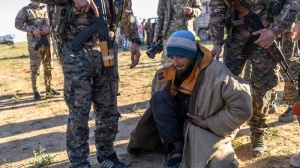
Plans for Still-Radicalized Members of the Islamic State

A man surrenders outside Baghouz. Image Credit: Al-Jazeera.
Near-victory has been declared over the remnants of the Islamic State’s self-declared caliphate in Iraq and Syria. However, some fighting still remains, and the implications of continued conflict are beginning to be explored. Waves of often-reluctant Islamic State members coming to surrender exacerbate the daunting job that those participating in the fight against extremist ideologies are facing. As recently as last week, 3,000 suspected fighters and active Islamic State members have surrendered, overloading those tasked with analyzing the future threat these individuals pose. This writing intends to promote a conversation about the dilemma of those ‘hardcore’ believers in the Islamic State, examining how or if they can assimilate to Western society.
Since December, roughly 60,000 people have fled from the area around Baghouz, Syria, the last populated stronghold of the crumbling caliphate. These individuals have been captured or placed into displaced persons camps. Estimates suggest that around 10% of these people are believed to be Islamic State fighters, with many others being family members of current or former fighters. Through various Islamic State propaganda outlets, as well as debriefing reports from people who have previously fled Islamic State-controlled territory, it is known that there has been a strong effort to indoctrinate children into the ideology spread by the group. For this reason, the children of Islamic State members should receive increased attention in the deradicalization process.
The Islamic State has continued its propaganda campaign, which was once a driving factor behind the groups rapid expansion, from within Baghouz. In one video, a man going by the kunya of Abu Abdel Adheem states that “it is said that we have lost – but God’s judging standard is different”. In another, a man going by Abu Abd al-Azeem, is quoted as stating “Tomorrow, God willing, we will be in paradise and they will be burning in Hell”. This is hardly the language of repentant individuals or individuals, making it unlikely that they will be susceptible to many deradicalization programs.
It is unclear how many foreign fighters of Western origin remain in Baghouz, but those that are there should be considered some of the most adherent followers to the group. Many existing deradicalization programs are targeted towards individuals who are psychologically open to leaving an ideology. Those individuals still clinging to the last remnants of the caliphate in Syria, and those who have reluctantly surrendered, do not generally fit into this profile. Numerous Westerners, including Americans, have been captured recently and are considered suspected members of the Islamic State. It is important to distinguish between individuals who were indeed captured and those who willingly surrendered due to a change in ideology and not due to the caliphate being on the losing side of the conflict. Those who have surrendered of their free will are likely good candidates for deradicalization programs. Those who have surrendered but remain loyal to the vision of the Islamic State represent a real problem for all Western nations.
Further complicating the situation, there are Westerners still engaged in the fighting. Zulfi Hoxha, an American who goes by the kunya of Abu Hamza al-Amriki, has risen through the ranks of the Islamic State and is now believed to be a Senior Commander. There have been no public declarations of his death or whereabouts. How exactly do we plan to deradicalize Hoxha? Is deradicalization even a possibility?
Those Islamic State members still operating in Iraq and Syria have been displaced from their once-vast caliphate. Some have given up on the vision, but it appears that many still place their loyalty in the future of the proto-state. Numerous officials from the United States have suggested that they do not believe that there are any senior Islamic State members, including caliph Abu Bakr al-Baghdadi, in Baghouz. The unknown location of these leaders represents the continued threat that the group will once again reform down the road, with lessons learned. Until then, it is imperative that we decide what to do with those who have left.
John Patrick Wilson is a Law Enforcement Professional and Research Fellow at Rise to Peace
